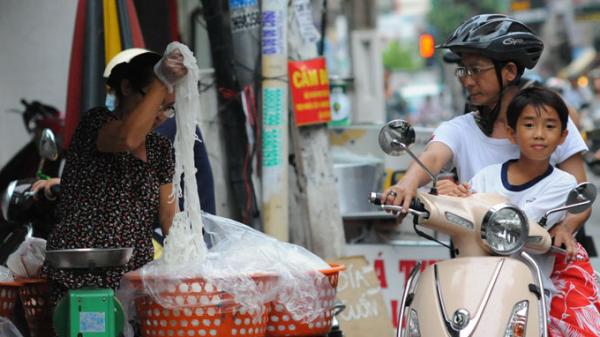Many samples of rice vermicelli taken from four southern provinces and cities, including Ho Chi Minh City, have been found to contain Tinopal, a toxic substance that can cause cancer, the food safety agency reported.
>> 75% of Vietnamese pho samples found toxic: food tests The discovery was made during recent inspections conducted in a series of provinces and cities across the country by experts from the Health Ministry’s Food Safety Department. The inspections were conducted after the Center for Study and Consultation on Consumerism (CESCON) in late June announced the results of its safety inspections, which showed that more than 80 percent of the Vietnamese rice vermicelli samples taken for tests in HCMC contained Tinopal, a banned chemical. Tinopal is a fluorescent optical brightener, and when it is added to rice vermicelli, it makes it look whiter, brighter and fresher than normal, and thereby more attractive to customers. During their inspections, the Department listed Ho Chi Minh City and three southern provinces including Ba Ria-Vung Tau, Tay Ninh, and Can Tho as the four localities where samples of rice vermicelli contained Tinopal and Oxalic acid, both of which are industrial chemicals that are banned from use as food additives by the Health Ministry. In HCMC, the toxic samples were detected at three production facilities. At Hoang Thanh, located in District 6, two samples of woven rice vermicelli contained Tinopal, and two others contained Sodium Sulfite at an amount that was above the allowable limit. At Phuong Dung in Go Vap District, a sample of rice noodle contained Tinople; and at Cat Tuong Co Ltd in the same district, a pho noodle sample was tainted with Oxalic acid. In Tay Ninh Province, inspectors detected samples containing Tinopal at two producers; in Can Tho, two such samples were detected; and in Ba Ria-Vung Tau, a toxic sample and a volume of Tinopal were found. Meanwhile, 72 samples taken from Khanh Hoa, Quang Ninh, Hai Phong, Ha Nam, Yen Bai, Bac Kan, Ha Tinh, Lao Cai and Hanoi did not contain Tinopal, the Food Safety Department said. As previously reported, during its food safety inspection, CESCON collected 30 samples of six types of Vietnamese rice noodle, including pho, bun, banh canh, banh hoi, banh cuon, and banh uot between June 15 to 25 for tests. The samples were randomly taken from nine food selling facilities, including three supermarkets.
The test results showed that five out of the six types of rice noodle, or 24 out of 30 samples and an 80 percent proportion, were found to contain Tinopal. Worse, 100 percent of the collected samples of banh canh, banh hoi, and banh uot contained the banned chemical. Regular, extended consumption of Tinopal can do harm to a person’s digestive system, and can even cause kidney and liver failure as well as cancer, CESCON deputy director Do Ngoc Chinh said.






















































